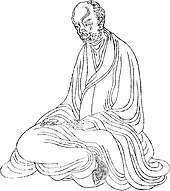Huiyuan (Buddhist)
Huiyuan ( Chinese 慧遠 , W.-G. Hui-yüan ; 334–416 AD) was a Chinese Buddhist teacher who founded the Donglin Temple on Mount Lu Shan in Jiangxi Province and founded it in 404 AD wrote the text Why Monks Do Not Kneel Before Kings ( Chinese 沙門 不敬 王者 論 ). He was born in Shanxi Province , but after a long period of Buddhist teaching, he finally came to Jiangxi Province, where he died in AD 416. Although he was born in the north, he moved south to live under the rule of the Eastern Jin Dynasty .
Huiyuan was later referred to as the first patriarch of Amitabha Buddhism . His students included Huiguan ( Chinese 慧 觀 ), Sengji ( Chinese 僧 濟 ) and Faan ( Chinese 法 安 ).
Life

Huiyuan began studying the teachings of Zhuangzi , Laozi, and Confucius at a young age . Nevertheless, he was 21 years in the province of Hebei of Dao'an ( Chinese 道安 , Pinyin Dào'ān , W.-G. Tao-an ; 312-385), the Chinese students a kuchanischen convinced missionary from Buddhism. Dao'an convinced Huiyuan to "leave the family" and devote his life to Buddhist teachings. Huiyuan later became the patriarch of Donglin Temple on Lu Shan Mountain. He has taught various things , including Vinayapitaka ( Chinese 戒律 ), Meditation ( Chinese 禪法 ), Abhidhammapitaka, and Prajñā . Although the patriarch did not advocate contact with the secular world, he did have contacts with noble families. Huiyuan was invited to two meetings by dictator Huan Xuan to discuss the status of the clergy ; he defended the independence of the clergy. Members of the cultural class came to the temple to participate in religious life as its disciples. He also had a correspondence with the monk Kumārajīva .
In 402 he founded the religious group of Mahayana with a group of monks and lay people , from which Amitabha Buddhism emerged.
In 404 Huiyuan wrote the work why monks do not kneel before kings . In this book he advocated the political independence of the Buddhist clergy from the state system. At the same time, he pursued the aim of the text to convince monarchs and Confucian-influenced state ministers that Buddhists are not necessarily subversive. He explained that Buddhists could be good role models because they believe in retribution through karma and seek to be born again in Paradise. Despite her reputation for leaving families behind for monastic life, Huiyuan stated that those who support the Buddha's path would first obey their parents and masters.
See also
literature
- Theodor de Bary: Huiyuan: A monk does not bow down before a king. In: Sources of Chinese tradition. Volume I. Columbia University Press, New York 1999, pp. 426-428.
- Patricia Buckley Ebrey: The Cambridge Illustrated History of China. Cambridge University Press, Cambridge 1999, ISBN 0-521-66991-X .
- Kenneth Kenichi Tanaka: The dawn of Chinese pure land Buddhist doctrine. Ching-ying Hui-yuan's Commentary on the Visualization sutra. State University of New York Press, Albany 1990.
- Erik Zürcher: The Buddhist conquest of China. The spread and adaptation of Buddhism in early medieval China . With a foreword by Stephen F. Teiser. 3. Edition. Brill, Leiden / Boston, MA 2007, ISBN 978-90-474-1942-6 , pp. 204-253 .
Individual evidence
- ↑ a b Patricia Buckley Ebrey: Cambridge Illustrated History of China. P. 97.
- ^ Charles B. Jones: What Lushan Huiyuan a Pure Land Buddhist? Evidence from His Correspondence with Kumārajīva About Nianfo Practice . In: Chung-Hwa Buddhist Journal . No. 21 , 2008, ISSN 1017-7132 , p. 175-191 ( enlight.lib.ntu.edu.tw [PDF]).
- ↑ Shinko Mochizuki: Pure Land Buddhism in China: A Doctrinal History . In: Richard K. Payne (Ed.): Pacific World Journal . Third Series, No. 3 , 2003, Chapter Three: Hui-yuan of Mt.Lu , p. 251 ( shin-ibs.edu [PDF] translated by Leo M. Pruden).
| personal data | |
|---|---|
| SURNAME | Huiyuan |
| ALTERNATIVE NAMES | Hui-yuan |
| BRIEF DESCRIPTION | Chinese Buddhist |
| DATE OF BIRTH | 334 |
| PLACE OF BIRTH | Shanxi |
| DATE OF DEATH | 416 |
| Place of death | Jiangxi |

